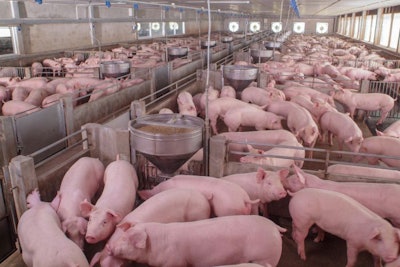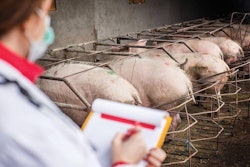
NPPC president says continued vigilance is important to the US pork industry
Keeping the African swine fever (ASF) virus from entering the U.S. is the top priority of the National Pork Producers Council (NPPC).
David Herring, NPPC’s president, discussed the council’s accomplishments in 2019 and goals for 2020 in a media teleconference on Wednesday.
“NPPC’s top priority for 2020 is continued vigilance to ensure ASF and other foreign animal diseases (FAD) do not enter our country,” Herring said.
“As a producer, the issue that keeps me awake at night is a foreign animal disease,” he said. “It’s probably the one issue that I have the least control of on my farm. When China got ASF in their country, it changed the picture of pork production, not only in the United States, but the whole world.”
Because of collaboration with the U.S. Department of Agriculture (USDA) and U.S. Customs and Border Protection (CBP), Herring said, “we are in a better position today than we were a year ago.”
According to NPPC Chief Veterinarian Liz Wagstrom, NPPC has worked closely with USDA since ASF was first detected in China in August 2018 to increase animal disease surveillance, increase the capacity to be able to detect ASF quickly, and examine and improve response strategies.
“While there is always more we want to do, we feel we’ve really made great progress in the last 15 months,” she said.
NPPC has advocated for more agricultural inspectors at U.S. ports of entry to prevent ASF and other FAD from entering the U.S. On Tuesday, the House of Representatives approved an additional $19.6 million in funding for inspectors. Herring said NPPC’s goal is for an additional 600 inspectors to bring the total to 3,000.
He also said the U.S. is collaborating with its North American neighbors to keep the continent ASF free.
“The world has changed for pork production and, as long as we can keep it out of this country, we’re in a better place,” he said. “We’re working very diligently with the Mexicans and the Canadians in trying to keep North America free of ASF.”
US-China trade deal
Herring said the NPPC is pleased that the U.S. and China reached a trade agreement last week, but that the Trump administration hasn’t offered many details of the agreement.
“What we know today is very little except for we have been told that things look very positive for the pork industry,” he said. “We don’t know any details at this time as far as numbers.”
NPPC Vice President Nick Giordano said a trade deal between the two countries has the potential to be very good for the U.S. pork industry.
“What other sector can, in 10 years from now, slash 6% off the U.S.-China trade deficit?” he said. “Going back to before the U.S.-China trade dispute, China already was a billion-dollar export market for us. But, in 10 years at zero-tariff trade, it could be a 25 billion-dollar-a-year export market for us, creating almost 200,000 new U.S. jobs.”
Herring said U.S. is looking forward to helping China fill the protein gap it is experiencing.
“China represents an unparalleled opportunity for U.S. pork producers to provide the highest quality and most affordable pork in the world. It’s no secret that China needs reliable, affordable sources of pork. No source is better positioned to meet this need than American hog farmers.”
View our continuing coverage of the African swine fever outbreak.


















